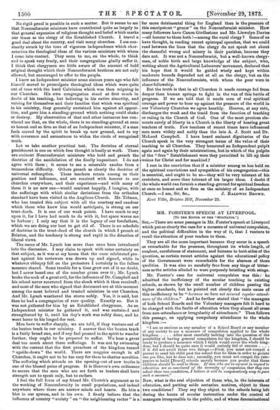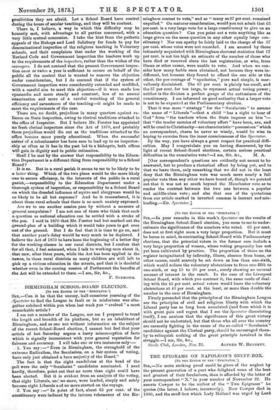MR. FORSTER'S SPEECH AT LIVERPOOL. [TO THS EDITOR OF THS
SPEOTANOR."1 Sia,—There are some passages in Mr. Forster's speech at Liverpool which put so clearly the case for a measure of universal compulsion, and the political difficulties in the way of it, that I venture to recall the attention of your readers to them.
They are all the more important because they occur in a speech as remarkable for the presence, throughout its whole length, of candour, carefulness of statement, and fairness to both aides of the question, as certain recent articles against the educational policy of the Government were remarkable for the absence of those qualities. It was also as carefully free from any tinge of bitter- ness as the articles alluded to were purposely bristling with stings.
Mr. Forster's case for universal compulsion was this : he admitted the inefficiency of the secular teaching in existing schools, as shown by the small number of children passing the higher standards, but he pointed out clearly the main cause of this inefficiency to be " because we have not secured regular attend- ance of the children." And he further stated that "the managers of both School Boards and the Voluntary managers felt it hard to be charged with the faults of education when they almost all arose from non-attendance or irregularity of attendance." Then follows this passage, on applying compulsory attendance to the whole kingdom :- " I am as anxious as any member of a School Board or any member of any society to see a measure of compulsion applied to the whole
kingdom After most carefully looking into the question of the possibility of having general compulsion for the kingdom, I should be ready to produce a measure which I think would cover the whole king- dom, but I should be quite sure it would entirely fail of success . .
if it did not avoid those two things:—First, you must not compel a parent to send his child past the school that he likes in order to go into one you like, but he does not ; secondly, you must not compel the rate- payers to build [Board] schools merely because you prefer that these children should be sent to them. If men tcho are in earnest in regard to education are so convinced of the necessity of compulsion that they can admit these two conditions, I believe it will be comparatively easy to pass such a measure."
Now, what is the real objection of those who, in the interests of education, and putting aside sectarian motives, object to these two conditions ? They say they object to the schools being left during the hours of secular instruction under the control of managers irresponsible to the public, and of whose denominational proclivities they are afraid. Let a School Board have control during the boars of secular teaching, and they will be content.
There is, I believe, a way in which this difficulty may be honestly met, with advantage to all parties concerned, with a very little mutual concession. I take the hint from the pathetic appeals of the Bishops and Lord Salisbury for funds to pay for -denominational inspection of the religious teaching in Voluntary schools, and their complaints that under the working of the Revised Code and Government inspection the teachers work up to the requirements of the inspectors, rather than the wishes of the enanagers. I do not contend that the present Government inspec- tion once or twice a year is sufficient to secure on behalf of the public all the control that is wanted to remove the objection tinder consideration, but I do contend that if the system of ‘Government inspection were considerably extended and modified, with a careful aim to meet this objection—if it were made less spasmodic and more steady and constant, less of an annual examination and more of a careful watching of the general -efficiency and earnestness of the teaching—it might be made to meet the requirements of the case.
There are, no doubt, prejudices in many quarters against re- liance on State inspection, owing to clerical traditions attached to the office of Inspector. But I believe Mr: Forster has appointed .no fresh clerical inspectors since the Act of 1870, and probably 'these prejudices would die out as the traditions attached to the office became more purely educational. When the successful -career of a' schoolmaster has been seen to lead up to an inspector- ship as often as it has in the past led to a bishopric, both offices 'will gain in dignity and in public estimation.
Shall I be met by the answer that responsibility to the Educa- tion Department is a different thing from responsibility to a School 33oard ?
It is so. But in a rural parish it seems to me to be likely to be a better thing. Which of the two plans would be the more likely one to secure efficiency, in the interests of the public in a rural .parish,—responsibility to the Education Department under a thorough system of inspection, or responsibility to a School Board -on which the dreaded influence of squire and clergyman would be so likely to be all but supreme? And be it remembered, it is about these rural schools that there is so much anxiety expressed.
Are we to see another session pass by without a measure of general compulsion ? I am not one of those who think that such a question as national education can be settled with a stroke of the pen. I said in 1870 that Mr. Forster had but marked out the ground-plan of a building which it would take years to get even out-of the ground. But I do feel that it is time to go on, and that another year's delay would be very much to be deplored. I 'believe the Act of 1870 to have been the beginning of a better day for the working-classes in our rural districts, but I confess that 'for all that, I feel ashamed, when I talk to working-men about, it, that now, after three years, while the Act has been applied in the towns, in these rural districts so many children are still left to pick up a vicious education in the streets, and that it is doubtful whether even in the coming session of Parliament the benefits of the Act will be extended to them. —I am, Sir, &c.,
F. SEEBOHM.







































 Previous page
Previous page